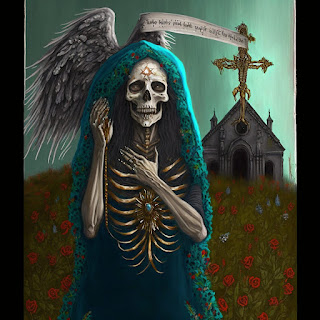An independent blog promoting professional development for Universal Life Church ministers.
Wednesday, February 22, 2023
Faith and Knowledge
Many of the so-called "proofs" for the existence of God appear to hinge on a person already believing that such a God exists. Nowhere is this more apparent in my mind than with Thomas Aquinas, who frequently wrote, in varying words, that ‘everyone understands that this is God.’ He was living in a Christian culture where the presuppositions were on his side. No doubt most if not all of the people in his life agreed together on the general nature of a supreme being who created the universe, even if they may have differed on some particulars. He might have been shocked, as I was, when I started meeting atheists who had been atheists since childhood, having always thought the stories about God to be silly or at least improbable. It could also have troubled him to have encountered people from cultures where the nature of the divine was either not considered of great import, or not understood as a personal deity to be known. A lot of assumptions go into the reasonings about proving God’s existence.
Anselm of Canterbury famously describe God as "that than which a greater cannot be thought." In recent years I've learned that he wrote his ontological argument in a work of meditation, not of logical reasoning. In other words, no ‘argument’ was intended at all, and it appears he was self-aware in writing from his perspective as a believer in God. Already believing, he found this way of thinking to be faith-affirming. That being the case, it seems uncharitable to take him to task for such a weak argument.
Someone could assert that an Invisible Pink Unicorn is the creator of all things, having swept the cosmos into being with a tilt of her glitter-laced horn. How can she be both invisible and pink? Why, that’s a divine mystery to be contemplated. After all, she is that than which nothing greater can be conceived. Maybe that’s quibbling over details though. Assuming that there is ‘that than which nothing greater can be conceived’ is a different question from the nature of that being, whether an Invisible Pink Unicorn, a Trinity, or something else.
It seems to me that such reasons ‘proofs’ for the existence of God can only ever serve as encouragement to those who have already taken a leap of faith, or are on the verge of doing so. They cannot possible provide the conclusive evidence that would be required to become considered knowledge. In the end, “Now faith is confidence in what we hope for and assurance about what we do not see” (Hebrews 11:1). If it were knowledge, it would not be faith. And if faith is not required, then why does the New Testament repeatedly call for it?
To be clear, faith is not a moral virtue. When believing in something without or against evidence is held up as a moral triumph, a door is opened to embracing virtually anything that someone thinks 'makes sense' to someone. This is not to say that faith is evil, by any means. It sustains the lives of many through dark times. What I am arguing is that when it comes to making clear-eyed decisions that impact other people, knowledge is of far greater value than faith, on a par I would say with empathy. These two together can change the world.
Thursday, February 16, 2023
Having a Canon
See Also:
Yale Bible Study, Formation of the Biblical Canon: New Testament (Video)
Tuesday, February 14, 2023
Tuesday, February 7, 2023
Open Ordination
Thursday, February 2, 2023
Devoted to Death?
Andrew Chesnut is essentially the scholar of Santa Muerte, and he wrote a book about her and the people who call upon her. There is also a Facebook Group Chesnut runs that might be worth a look for you. That said, I'm not going to spend a lot of time explaining devotion to this entity. She is viewed variously as a folk saint or as a goddess in her own right, and she is adored by people of all walks of life, not just narcotraffickers like in series and movies. She is called upon often for things other saints would not attend to, and can bring both weal and woe. There are temples, chapels, and so forth dedicated to her, although the Roman Catholic Church opposes her adoration and teaches against it emphatically. While she got her start in Mexico, and remains strongest there, she is known now throughout the world, with people in numerous nations either including her at their home altars, or dedicating them to her.
In the United States a person could incorporate a Santa Muerte church and ordain themselves, but that's a lot of work and costs money. Meanwhile, the Universal Life Church headquarters in Modesto, California sends a credential for free to anyone who applies for ordination. The newly-minted minister can proceed to officiate weddings and any other rituals after the fashion of their faith, and where legality matters, it will be recognized. Further, those ordained through the headquarters can get on the track to become certified chaplains, as only the original Modesto-based denomination can sign off on that as one of the steps. Imagine ordained and certified chaplains who follow Santa Muerte offering comfort, encouragement, and presence to those in need.
So, whether you are 'devoted to death' or follow some other less-well-recognized path, the Universal Life Church welcomes you and is ready to endorse you. Click here to apply.



